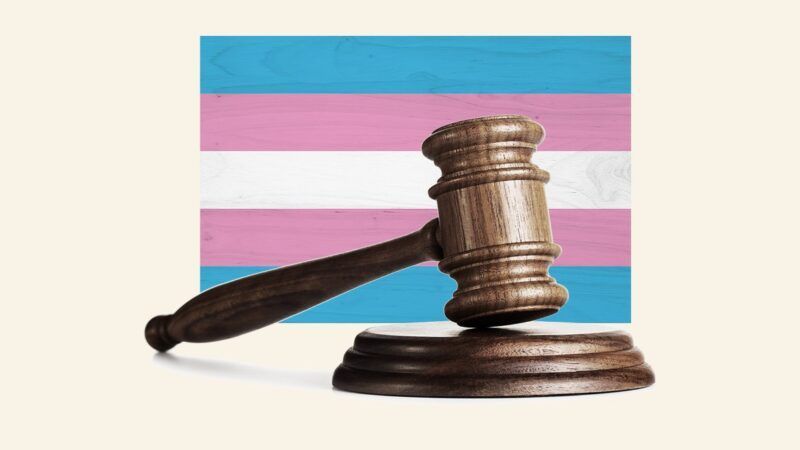Federal Judges Are Blocking State Anti-Trans Bills
Culture war bills signed into law in Arkansas, West Virginia, and Tennessee run afoul of Constitution, federal law.

Federal judges Wednesday blocked new laws in Arkansas and West Virginia that sought to limit how transgender students' participation in school sports and prohibit parents and professionals from providing transgender minors with medical treatments.
West Virginia lawmakers passed H.B. 3293 in April. The bill requires students who wish to participate in sports events to be classified on the basis of their biological sex, specifically so that trans girls (who were born male but identify as female) cannot compete as females. The law is written so that it doesn't stop trans boys from competing with biological males. That will become relevant later.
Arkansas lawmakers, meanwhile, passed an anti-trans bill in April that forbids health professionals from prescribing any sort of medical treatment (like puberty-blocking hormones) to trans teens, even with the support of the parents. The bill, H.B. 1570, went so far as to forbid doctors from referring minors to other doctors (presumably in other states) who would provide such treatments and threatened to revoke the licenses of any medical professionals who defied the law. Republican Gov. Asa Hutchinson vetoed the bill, but lawmakers overruled him.
Both laws have been temporarily blocked by different federal judges. In West Virginia, the American Civil Liberties Union filed suit on behalf of an 11-year-old trans girl who wants to participate in her middle school's cross-country racing team. In Arkansas, the ACLU filed suit on behalf of four trans youths and their families and two doctors.
In West Virginia, U.S. District Judge Joseph R. Goodwin of the U.S. District Court for the Southern District of West Virginia found that it was likely the plaintiff would win the case under the argument that the state had violated her equal protection rights under the 14th Amendment and had violated Title IX of the Education Amendments of 1972. Therefore he ordered an injunction stopping H.B. 3293 from being enforced as the case works its way through the court system. He wrote:
[P]ermitting B.P.J. to participate on the girls' teams would not take away athletic opportunities from other girls. Transgender people make up a small percentage of the population: 0.6% of the adult population generally, and 0.7% of thirteen- to seventeen-year-olds. … The number of transgender people who wish to participate in school-sponsored athletics is even smaller. Insofar as I am aware, B.P.J. is the only transgender student at her school interested in school-sponsored athletics. Therefore, I cannot find that permitting B.P.J. to participate on the girls' cross country and track teams would significantly, if at all, prevent other girl athletes from participating.
He adds that the argument that a ban on trans girls competing with biological girls in order to protect girls' safety fails because the plaintiff was not asking to participate in a contact sport. Goodwin concludes that the girl is being discriminated against on the basis of her sex in the same way the Supreme Court ruled in Bostock v. Clayton County that workplace discrimination against gay and trans workers is discrimination on the basis of sex. And because the law explicitly permits trans boys to continue competing with other boys, Goodwin notes that everybody else gets to compete on sports teams on the basis of their chosen identity except for the plaintiff and other trans girls, making it a discriminatory policy.
In Arkansas, U.S. District Judge James M. Moody Jr., of the U.S. District Court for the Eastern District of Arkansas, granted a preliminary injunction in a bench decision Wednesday afternoon stopping the enforcement of Arkansas' ban on medical treatment for trans minors. This is not his final decision in the case. Rather, the injunction will allow parents and families to continue seeking medical treatment while he considers his ruling. The law was scheduled to go into effect later this month, and the ACLU and parents argued that it would force them to cut off medical treatment their trans children were already receiving.
These rulings follow on the heels of one of the dumber new anti-trans laws being blocked earlier this month. Tennessee lawmakers in May passed a law ordering private businesses to hang up warning signs if they allowed trans people to use the bathrooms of their chosen sex rather than their biological sex. Businesses who were found violating the sign law faced misdemeanor penalties under the state's building codes.
Two business owners, again represented by the ACLU, filed suit, arguing that this sign demand violates their First Amendment rights by mandating speech. U.S. District Judge Aleta A. Trauger of the U.S. District Court for the Middle District of Tennessee, Nashville Division, ruled that the plaintiffs were likely to succeed on the claims and granted a preliminary injunction stopping enforcement of the law.


Show Comments (152)